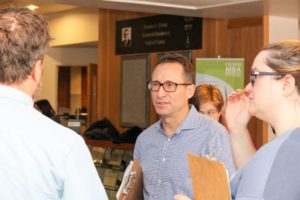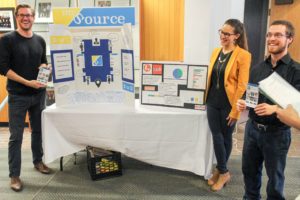This post was written by Seth Gillim ’18
 On the last day of November, the students of The Sustainable Innovation MBA hosted their annual Business Model Trade Show in the bustling lobby of Kalkin Hall. Visitors toured booths, sampled products and learned about the creative enterprises students have been working on throughout Module 2. For the students, it was a great opportunity to hone their elevator pitch and get feedback for their business ideas from noted visitors like venture capitalist and UVM alum David Aronoff, a general partner at Flybridge Capital Partners.
On the last day of November, the students of The Sustainable Innovation MBA hosted their annual Business Model Trade Show in the bustling lobby of Kalkin Hall. Visitors toured booths, sampled products and learned about the creative enterprises students have been working on throughout Module 2. For the students, it was a great opportunity to hone their elevator pitch and get feedback for their business ideas from noted visitors like venture capitalist and UVM alum David Aronoff, a general partner at Flybridge Capital Partners.
The Trade Show is the brainchild of professor Erik Monsen. His course, Crafting the Entrepreneurial Business Model, focuses on developing and assessing the viability of a business from the ground up. Students draw on their core MBA toolkit in finance, accounting, marketing and business strategy to dream up new, sustainable ventures that create value in innovative ways. The goal is to become more comfortable thinking entrepreneurially, as well as understand the inherent challenges and complexities of launching new ventures.
 Many of the businesses focus on creating consumer goods that fill an unmet or underserved need in the marketplace. For instance, B3 is a consumer health company that offers simple, effective and environmentally friendly shampoo products made entirely from water, baking soda, and essential oils. Visitors to the trade show learned that the average shampoo contains more than 30 ingredients, many of which are known to cause adverse health and environmental effects. Another team of students with science and engineering backgrounds created Conscious Coffee Pods: small on the go servings of coffee in an algae-based pod that are shelf-stable, easily dissolved in water, and produce no packaging waste. Yet a third team created Flip Balm, an on the go algae-based sunscreen that attaches to a wristband made of recycled ocean plastic.
Many of the businesses focus on creating consumer goods that fill an unmet or underserved need in the marketplace. For instance, B3 is a consumer health company that offers simple, effective and environmentally friendly shampoo products made entirely from water, baking soda, and essential oils. Visitors to the trade show learned that the average shampoo contains more than 30 ingredients, many of which are known to cause adverse health and environmental effects. Another team of students with science and engineering backgrounds created Conscious Coffee Pods: small on the go servings of coffee in an algae-based pod that are shelf-stable, easily dissolved in water, and produce no packaging waste. Yet a third team created Flip Balm, an on the go algae-based sunscreen that attaches to a wristband made of recycled ocean plastic.
Other groups of students focused on using the for-profit model to deliver consumer services efficiently and equitably. A team of students founded Pathways, an organization that works to connect with place high school students in gap year programs around the world. In addition to placements, Pathways teaches critical life skills like cultural competency, work-life balance, focus and healthy risk-taking. Still another group have formed Tiny Bliss, a micro-community of Tiny Homes offering a unique rent-to-equity model where tenants have a portion of each month’s rent set aside and invested. One of the biggest challenges facing millennials is they cannot set aside enough for a mortgage down payment due to the high cost of rent. Tiny Bliss’ flexible financial model seeks to solve this problem while offering fun, alternative and low-carbon living at the same time.
Other start-ups included a shared workspace venture, a location-based app that matches consumers with their social interests, and a novel building supply company that sources reclaimed materials like pallets and glass bottles for DIY construction projects.
The Business Models trade show is quintessential SIMBA: students’ imagination and entrepreneurial grit is on full display, as is their hard-nosed attention to financial cost models and real-world constraints and challenges of launching a start-up.
